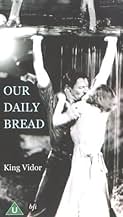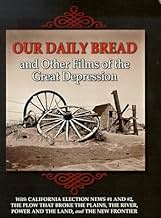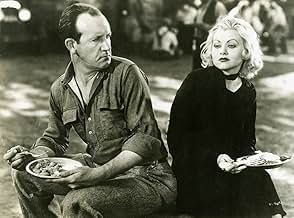PUNTUACIÓN EN IMDb
7,0/10
2,2 mil
TU PUNTUACIÓN
A un matrimonio le ceden una finca para cultivar, como no saben nada, deciden crear una cooperativa para compartir el trabajo.A un matrimonio le ceden una finca para cultivar, como no saben nada, deciden crear una cooperativa para compartir el trabajo.A un matrimonio le ceden una finca para cultivar, como no saben nada, deciden crear una cooperativa para compartir el trabajo.
- Premios
- 1 premio en total
C.E. Anderson
- Schultz
- (sin acreditar)
Earl Askam
- Farmer
- (sin acreditar)
Lionel Backus
- Barber
- (sin acreditar)
Eddie Baker
- Deputy Sheriff
- (sin acreditar)
Jack Baldwin
- Motorcyclist
- (sin acreditar)
Marion Ballou
- Old Lady
- (sin acreditar)
Argumento
¿Sabías que...?
- CuriosidadesIn the early 1950s, Orson Welles chose this film as one of his 10 favorite movies of all time.
- ConexionesEdited into Histoire(s) du cinéma: Une histoire seule (1989)
Reseña destacada
A young impoverished couple (Tom Keene, Karen Morley) with no employment is given some land and a farm by an uncle during the Depression.The couple finds hardships on their way and they'll have to fight against distress, elements, and drought. They are helped by some hapless people (John Qualen and many others) and success in managing the land, creating a socialist community . They find hardships as the struggle to support themselves. As they struggle to maintain their dignity and pride and the enjoyable community is peppered with some happy moments, Meanwhile a cover-girl (Pepper) is tempting to the protagonist John.
This is a naturalist rural drama magnificently performed and splendidly staged. This look at day-to-day existence of a poor-class couple is a superb naturalistic celebration of fighting to survive amid all the disgraces, and drought. Its best scenes are referred when the workers are commonly digging the land and water running through the furrows. It contains with numerous sequences highly influenced by Russian directors, such as Alexander Dovshenko and Sergei Eisenstein. Interesting screenplay by King Vidor, risking bankruptcy to finance it, furthermore clever dialogs by the great director Joseph L Mankiewicz. It was a deserved critical success for its sincere treatment of sentiments and its thrillingly slick edition, and innovative utilization of mobile camera. Neo-realist and evocative photography by Robert Planck. Sensible and imaginative musical score by the classic Alfred Newman.
The picture is originally directed by King Vidor. After his successful ¨The last parade¨ one of the great war films of the silent era, he directed ¨The crowed(1928)¨, one of the best mute motion pictures, that is a precedent to ¨Our daily bread¨ and concerning about a working-class people against the backdrop of wealthy society. Later on, Vidor explored similar theme in ¨Street impact¨and he went on filming successful movies such as ¨Duel in the sun (46)¨, ¨Fountainhead(49), ¨Ruby Gentry¨ terminating with blockbusters as ¨War and Peace¨and ¨Solomon and Sheba¨. Rating : Better than average. This sentimental and religious film appeal to uncharacteristic Hollywood epic buffs.
This is a naturalist rural drama magnificently performed and splendidly staged. This look at day-to-day existence of a poor-class couple is a superb naturalistic celebration of fighting to survive amid all the disgraces, and drought. Its best scenes are referred when the workers are commonly digging the land and water running through the furrows. It contains with numerous sequences highly influenced by Russian directors, such as Alexander Dovshenko and Sergei Eisenstein. Interesting screenplay by King Vidor, risking bankruptcy to finance it, furthermore clever dialogs by the great director Joseph L Mankiewicz. It was a deserved critical success for its sincere treatment of sentiments and its thrillingly slick edition, and innovative utilization of mobile camera. Neo-realist and evocative photography by Robert Planck. Sensible and imaginative musical score by the classic Alfred Newman.
The picture is originally directed by King Vidor. After his successful ¨The last parade¨ one of the great war films of the silent era, he directed ¨The crowed(1928)¨, one of the best mute motion pictures, that is a precedent to ¨Our daily bread¨ and concerning about a working-class people against the backdrop of wealthy society. Later on, Vidor explored similar theme in ¨Street impact¨and he went on filming successful movies such as ¨Duel in the sun (46)¨, ¨Fountainhead(49), ¨Ruby Gentry¨ terminating with blockbusters as ¨War and Peace¨and ¨Solomon and Sheba¨. Rating : Better than average. This sentimental and religious film appeal to uncharacteristic Hollywood epic buffs.
- ma-cortes
- 13 ago 2009
- Enlace permanente
Selecciones populares
Inicia sesión para calificar y añadir a tu lista para recibir recomendaciones personalizadas
- How long is Our Daily Bread?Con tecnología de Alexa
Detalles
Taquilla
- Presupuesto
- 125.000 US$ (estimación)
- Duración1 hora 20 minutos
- Color
- Relación de aspecto
- 1.37 : 1
Contribuir a esta página
Sugerir un cambio o añadir el contenido que falta

Principal laguna de datos
By what name was El pan nuestro de cada día (1934) officially released in India in English?
Responde




















